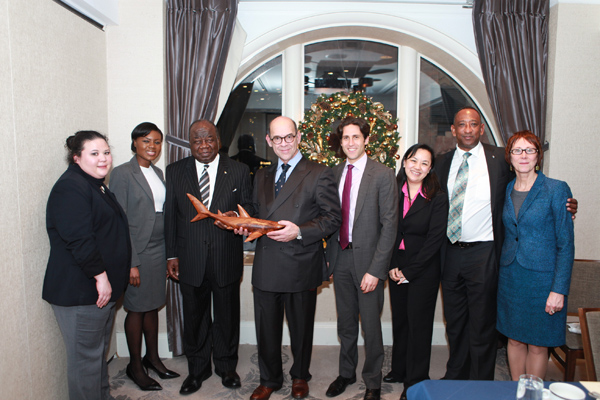From:TheBahamasWeekly.com
Bahamas assumes chairmanship of United Nations Shark Coalition
By Oswald Brown
Dec 19, 2013 - 11:52:01 PM

At the luncheon held for the formal handover of chairmanship of the United Nations Shark Coalition from Palau to The Bahamas on Tuesday, December 10, from left to right are: Ms Kimberley Lam, Second Secretary, Permanent Mission of The Bahamas to the United Nations; Ms Sasha Dixon, Third Secretary, Permanent Mission of The Bahamas to the United Nations; His Excellency Dr. Elliston Rahming, Bahamas Ambassador to the United Nations and the OAS; His Excellency Stuart Beck, Ambassador of Oceans and Seas for the Republic of Palau; Mr. Aaron Koman, Counsellor, Republic of Palau Mission; Ms Joan Yang, Senior Officer for International Ocean Policy, PEW; Mr Craig Powell, Third Secretary, Permanent Mission of The Bahamas to the United Nations; and Ms. Imogen Zethoven, Director of Global Shark Conservation, PEW.
|
NEW YORK -- In a brief but impressive ceremony on Tuesday, December 10, 2013, The Bahamas assumed chairmanship of the United Nations Shark Coalition, which affords the country a leadership role on a global platform of international significance.
His Excellency Dr. Elliston Rahming, The Bahamas Ambassador to the United Nations and the Organization of American States (OAS), accepted the chairmanship on behalf of The Bahamas as some 20 Ambassadors looked on.
This development is important for The Bahamas, considering that in July 2011 the then government banned shark fishing in all 240,000 miles of Bahamian waters.
According to the PEW Charitable Trusts, a multi-billion dollar entity which works to establish shark sanctuaries and which underwrites the costs of the coalition’s activities, shark diving provides some $78 million dollars to the Bahamian economy annually in tourism revenue. It has been estimated that a shark that is captured will yield up to $10,000 versus the $3 million that could be derived over that same shark’s lifetime if left in the ocean to be enjoyed and studied by divers and scientists.
A shark sanctuary is an area that forbids commercial fishing operations from catching sharks. The State of Palau created the first shark sanctuary in 2009, followed by the Republic of Maldives, Honduras, The Bahamas and Tokelau.
According to Wikipedia, every year, fishermen pull up close to 100 million sharks from the world’s oceans, and according to the UN Food and Agriculture Organization (FAO), more than half of the shark species face over exploitation or depletion. The search for shark fins drives the illegal hunting trade.
The International Journal of Conservation postulates that shark ecotourism (conservation) currently generates more than $314 million dollars per year world-wide and is expected to grow to $800 million dollars in 20 years.
Global shark fishing, on the other hand, yields $630 million dollars annually and is in decline.
In the Caribbean, shark tourism generates almost $124 million in tourism dollars annually supporting more than 5000 jobs.
The primary focus of the coalition is to encourage governments to create shark sanctuaries and to create an awareness of shark conservation as a major source of revenue.
The Bahamas will relinquish the chairmanship in December, 2014.
© Copyright 2013 by thebahamasweekly.com -